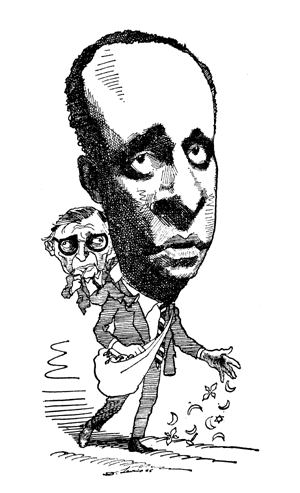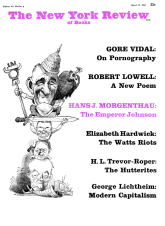Frantz Fanon, a Negro doctor born in Martinique, died of leukemia in a Washington hospital in 1961, before the end of the Algerian war. He had already become a hero to the leaders of the Algerian Revolution. The “provisional government” had his body brought to Tunis and “in the middle of the war the Algerians paused to honor one of their own in a national funeral.” So Simone de Beauvoir tells us in the last volume of her Memoirs. In contrast to many of Mme. de Beauvoir’s recollections, the portrait of Frantz Fanon is both sympathetic and objective. Frantz Fanon, whom the provisional government had not only considered to be a citizen of the new Algerian nation, but sent as an Ambassador to Accra, had formerly been a psychiatrist at the French military hospital of Blida in Algeria; he had observed there the effect of torture on the personalities of the tortured and torturers alike. Having become, not without difficulty, a French M.D., and having married a white Frenchwoman, Fanon was “integrated” in Paris. He chose to join the revolutionary forces, to uproot himself from France. But did he do so? Fanon seems, in retrospect, much more a typical voice of the left-wing Parisian intelligentsia than an expression of the “emergent” colonial nations which Sartre and his followers thought were replacing the European proletariat as the true “wretched of the earth” (a quote from “L’Internationale”).
As much as his own Martiniquean background, it was Fanon’s experience in Blida that compelled him to go beyond sympathy for the colonized and to identify himself completely with their struggle. He became a militant of the F.L.N. Fanon was a kind man who preached violence as the only hope for human dignity; a man of critical intelligence, who justified extreme simplifications; a wholehearted “Sartrian,” who yet believed that European thought had nothing to offer the “Third World” in its revolt and search for a new identity.
WHAT CAN ONE make today of this collection of essays which constitute his manifesto and have elevated him—next to Lumumba, who also died in 1961—to the rank of a hero and saint of “negritude” and of the war against “imperialism”? Fanon had watched the beginnings of a peaceful evolution to independence in the Black African States. He felt that it meant a shift of power to a Negro bourgeoisie more parasitic and corrupt than the European; he predicted that the former colonial power would take “fewer and fewer pains to mask the hold it has over the national government” (p. 153). The “independence” of the new African states was therefore for him a sham and a betrayal. His criticism of the new one-party states and their glorified leaders was often as savage as his description of life in cities under colonial rule. Those critics who have seen Fanon as nothing more than an ideologue of the “one-party states” have been less than fair. It is true that he expressed himself in a style which reminds one of Machiavelli and the “reflections on violence” by Georges Sorel, yet his aim was not totalitarian power, but a utopian freedom for the new nations through collective responsibility. He wanted an independent Party which would both express the needs of the people and remain wary of any corrupt political authority in the new states. As Marx did not want Stalinist rule but the withering away of the State, so Fanon calls for the withering away of the capital cities of the new African nations—seats of imperialist iniquity where he believed the traditions of bureaucracy and hero worship would inevitably flourish. The tribute that many African leaders like Colonel Boumedienne pay to Frantz Fanon does not alter the fact that Fanon was not a black Lenin, but a black Rousseau. He cared much less for economic “development” than for brotherhood, democracy, and a new nationalism. This was the doctrine of Rousseau, who advised the Poles not to catch up with the West, but to become ever more distinctly Polish. But Fanon’s nationalism can be defined tautologically as the struggle to form nations—he was not concerned with a nationalism which would grow from the historic traditions of the peoples involved or their tribal and regional backgrounds. His call for national revolutions is Jacobin in method, Rousseauist in spirit, and Sartrian in language—altogether as French as can be. Here speaks Fanon, the black Rousseau:
We do not want to catch up with anyone…if we want to turn Africa into a new Europe, then let us leave the destiny of our countries to Europeans. They will know how to do it better than the most gifted among us.
HOW WOULD Frantz Fanon have gotten along with the Algerian leaders after their victory? Believing that violent action was the essential purifying element in the quest for independence, he identified himself with a struggle, not with a people and the problems that faced them. But while there were many devoted fighters among the fellagha, there were few articulate or effective ideologues. Fanon belonged to the cosmopolitan fringe. He is comparable to the Prussian Clootz in the French Revolution, and to the many ardent foreigners who fought in the Russian and Spanish revolutions. These foreign idealists, eager to give wide international meaning to a specific struggle, have always been shaken off at some later stage. Ahmed Ben Bella was perhaps, in his way, the only “Fanonist” leader. Nearly two years ago he told David Rousset and myself that only peasants, not city workers, should be trusted as revolutionaries, and that the Party should be independent enough to control the State. This is pure Fanonism; and if Ben Bella became the kind of popular leader that Fanon warned against, one can still believe that his devotion to Fanon’s ideas was sincere. So much so, in fact, that he showed a suicidal indifference to undertaking the administrative reforms and planning required for Algerian economic development. But even Ben Bella expelled adopted Algerians, like the Eurasian lawyer Verges. The so-called “pieds rouges,” the “red” European missionaries of permanent African revolution many of whom I saw in Algiers working for the new State with the same selfless devotion as they had fought for it, were never fully accepted. The men who rule Algeria today would have little use for Fanon’s ceaseless exhortations; and the Algerian “masses” would make a Martiniquean Negro feel foreign in ways he would never have experienced in Paris. The prophet of Algeria’s national revolution would have found himself an exile from his chosen homeland, in search of another revolutionary war with which to identify himself. Che Guevara could have been at home practically anywhere in hispanic America, but Frantz Fanon would remain a stranger, even in Black Africa.
Advertisement
On the internal problems of the new states, apart from the need for a militant spirit, Fanon has little to say. It is another man from the Caribbean islands, the Jamaican economist Arthur Lewis, who has shown how economic progress can be linked with federalism (a dirty word for the true Jacobin Fanon) and political pluralism. (See his study “Beyond African Dictatorship” in the August 1965 issue of Encounter.) Yet Fanon’s exhortations do have a certain relevance today.
The native civil servants and technicians…ought not to bristle every time there is a question of a move to be made to the “interior.” We should no longer see the young women of the country threaten their husbands with divorce if they do not manage to avoid being appointed to a rural post. For these reasons, the Political Bureau of the Party ought to treat the forgotten districts in a very privileged manner; and the life of the capital, an altogether artificial life which is stuck into the real, national life like a foreign body, ought to take up the least space possible in the life of the nation. (p. 150)
This is indeed a utopian view. But like all deeply felt utopias, Fanon’s contains an important critical truth. The lack of concern of the new rulers for their most backward peasant populations, the absence of a “missionary” spirit impelling qualified intellectuals to work in the “wretched” hinterland rather than at UNESCO in Paris and in their country’s embassies have been real problems for the new nations. Fanon may yet be adopted as a prophet by the Black Muslims or by the truly “wretched of the earth” in South Africa and elsewhere. An ideologue of violence and struggle, he never mentions Gandhi and would have only scorn for his spirit of passive resistance. But his attacks on the cult of leadership—on the kind of autocracy that subsequently emerged in Ghana, for example—and on the domination of political parties by oppressive rulers, should remain prescribed reading for the elite of the New African States who swear by Fanon’s name, but igmore his warnings and hopes.
Jean-Paul Sartre’s Preface does not add much to Fanon’s book and should rather be discussed as part of his own political writings. Sartre is generous in not stressing how much Fanon is indebted to him, and especially to his notion of a “terrorist revolutionary brotherhood” as the only relevant instance of living democracy. But Sartre’s call for Europeans to repent all they have ever done in history—as if the economic relations of Europe with colonial countries were essentially the same as the Third Reich’s relation to Jews and Slavs—is a large misconception, a passionate mixture of blindness and insight, and shows little knowledge of the history of colonialism itself. Fanon does not theorize in this way. He expresses openly a political will, and does not disguise it as historical analysis. In this respect at least the pupil deserves more respect than the master.
Advertisement
This Issue
March 31, 1966




